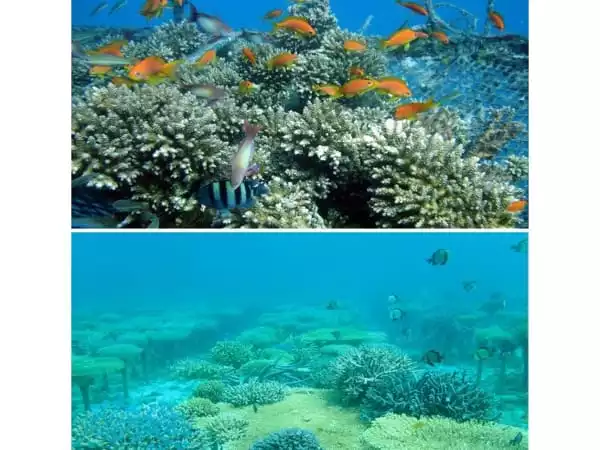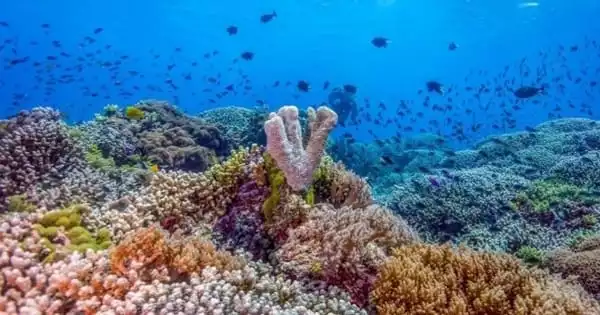Researchers are constructing symbiotic ‘underwater gardens’ in the Pacific Ocean to demonstrate how different coral species can collaborate to potentially restore degraded reefs. Corals are the foundation species of tropical reefs all over the world, but stressors ranging from overfishing to pollution to warming oceans are killing corals and reducing the critical ecosystem services they provide. Scientists have known for a long time that the loss of corals results in the loss of other reef species because corals build structures that provide living space for many other species. However, the significance of coral species diversity for corals was less well understood.
A new study from two Georgia Institute of Technology researchers offers both hope and a potentially bleak future for damaged coral reefs. Cody Clements and Mark Hay discovered that increasing coral richness by ‘outplanting’ a diverse group of coral species together improves coral growth and survival in their study, which was published in Science Advances. This discovery could be especially important in the early stages of reef recovery after a large-scale coral loss – and in supporting healthy reefs, which in turn support fisheries, tourism, and coastal storm surge protection.
The researchers also call for more research to better understand and harness the mechanisms causing these positive species interactions, with the dual goal of improving reef conservation and promoting a more rapid and efficient recovery of degraded reefs. However, the ecological pendulum also swings in the opposite direction. If more coral species become extinct, the synergistic effects could endanger other species, resulting in what Clements and Hay refer to as a “biodiversity meltdown.”
This discovery could be especially important in the early stages of reef recovery after large-scale coral loss and in supporting healthy reefs, which in turn support fisheries, tourism, and coastal storm surge protection.
Cody Clements and Mark Hay
“Yes, corals are the foundation species of these ecosystems, providing habitat and food for a wide range of other reef species,” said Clements, a Teasley Postdoctoral Fellow in the School of Biological Sciences. “Negative effects on corals frequently have a cascading effect on other species that live on coral reefs. If biodiversity is important for coral performance and resilience, then a “biodiversity meltdown” could exacerbate the global decline of reef ecosystems.”
Clements and Hay traveled to Mo’orea, French Polynesia, in the tropical Pacific Ocean, where they planted coral gardens with varying levels of coral species diversity in order to assess the relative importance of mutualistic versus competitive interactions among corals as they grew and interacted over time.
“We did the manipulations, and the corals should be competing with each other, but they actually do better together than they do alone,” said Hay, Regents Professor and Teasley Chair in the School of Biological Sciences. Hay is also the co-director of Georgia Tech’s Ocean Science and Engineering graduate program.
“We are still investigating the mechanisms underlying this unexpected result, but our experiments consistently show that positive interactions outnumber negative interactions in the reef environments where we conduct these experiments. That is, when you remove species from the system, you are removing some of the positive interactions, and removing critical ones may have a significant impact.”

Under the sea, in a coral-growing garden, in the shade
Coral reefs are under threat all over the world. According to Hay, the Caribbean has lost 80 to 90 percent of its coral cover, according to the EPA. Over the last 30 years, the Indo-Pacific region has lost half of its corals. During the 2015-2016 bleaching event, nearly half of the remaining corals on the Great Barrier Reef bleached and died.
“The frequency of these large bleaching and heating events that kill off corals has increased fairly dramatically in the last 20 to 30 years,” he said. “There are a few hotspots where coral reefs are still healthy, but they’re small and isolated in general.”
Hay and Clements experimented with the diversity of coral species in their coral gardens in French Polynesia, planting them on platforms resembling underwater chess boards to see if species richness and density affected coral productivity and survival.
Many previous, similar experiments, according to Hay, involved bringing corals into a lab to “pit species against each other.” However, as he points out, “All of our experiments are carried out in the real world. We’re not so much interested in whether it can happen as we are in whether it does.”
Clements’ experimental setup involving Coke bottles aided the scientists in arranging their garden. “Coca-Cola bottlecaps are embedded in the tops of the end tables,” Hay explained. “We can then cut off the necks of Coke bottles, glue corals into their upside-down necks, and screw them into and out of these plots. This allows us to not only arrange which species we want where but also unscrew and weigh them every couple of months to get accurate growth rates.”
The researchers discovered that increased biodiversity benefited corals “but only to a point,” as Clements put it. “Corals planted in gardens with an intermediate number of species – three to six species in most cases – outperformed those planted in gardens with a low number of species, such as one, or a high number of species, such as nine. However, we still don’t fully understand the processes that led to these findings.”
Clements stated that their research necessitates further investigation. Why do corals outperform single-species communities in mixed-species communities? Why, at the highest level of coral diversity, does this biodiversity effect diminish rather than increase? “We need a better mechanistic understanding of how diversity influences these processes to predict how biodiversity loss will impact corals and how we might be able to harness biodiversity’s positive influence to protect corals,” Clements said.





